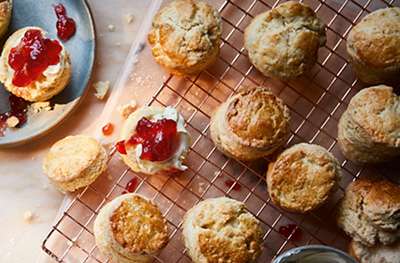0 added
Item price
50pPrice per unit
£1/kg
Please note, we take every care to ensure the product, allergen and recipe information displayed is correct. However, should a product be unavailable, alternatives may be displayed and/or a substitution provided. If you have an allergy or intolerance, please always check the product label before use.
Preheat the oven to 200ºC, gas mark 6 (or at the end of the chilling stage in step 4, if you have time to rest and chill the cut scone dough) and line a baking tray with parchment. Put the flour and butter into a large bowl. Rub the butter into the flour using your fingertips until well combined and the mixture roughly resembles breadcrumbs. It’s fine to see a few small pieces of butter, as this creates a flaky texture. Stir in the sugar, then make a well in the middle.
Gradually pour the milk into the centre of the well, stirring with a round-bladed knife as you do so. A soft, rough dough should form. You may need to add a little more milk to mop up any excess flour. Tip the dough out onto a lightly floured surface and knead briefly to smooth out the dough. Overhandling the dough makes your scones tough and flat, so knead as little as possible.
Gently roll the dough out to a thickness of about 2.5cm. Cut into rounds using a 4cm pastry cutter, cutting straight down. Twisting the cutter prevents the scones from rising properly. Gently pat together and re-roll the remaining dough, taking care not to handle it too much, and punch out more scones – you should get 10 in total.
If you have time, chill the cut scones for 30 minutes before baking for optimum height. Arrange on the lined tray, then brush the tops with a little beaten egg.
Bake in the preheated oven for 12-15 minutes, or until risen and golden brown. Serve warm from the oven, split in ½, with clotted cream and strawberry jam.
Keep it cool
Make sure your butter is as cold as possible before you rub it into the flour, and keep your scone dough as cool as you can – this will create the best rise possible in the oven. The scone dough I chilled rose 0.5cm higher than the dough I didn’t. Both were delicious but if you’re out to impress, chill your scone rounds! Chilling won’t affect the cook time.
Keep them fresh
Scones are a bake where the clock starts ticking as soon as they come out of the oven. A freshly baked scone is one of the great pleasures in life, but 24 hours later they will be hard and unyielding. I serve the scones I need, then freeze the rest immediately, ready to quickly defrost and heat through in a preheated oven when the mood strikes.
Keep it brief
Overkneading and overhandling the dough results in tough scones that don’t rise to their full potential in the oven. Keep each step as brief as possible for the best results.
Typical values per item when made using specific products in recipe
Energy | 657kJ/ 157kcals |
|---|---|
Fat | 6.1g |
Saturated Fat | 3.9g |
Carbohydrates | 21g |
Sugars | 3.4g |
Fibre | 0.8g |
Protein | 3.9g |
Salt | 0.3g |
Book a slot to see product availability at your nearest Waitrose & Partners store
0 added
Item price
50pPrice per unit
£1/kg0 added
Item price
£2.15Price per unit
£8.60/kg0 added
Item price
£2.65Price per unit
£2.65/kg0 added
Item price
£1.55Price per unit
68.2p/litre0 added
Item price
£3.75Price per unit
£7.50/kg0 added
Item price
£2.90Price per unit
£1.28/100g0 added
Item price
£1.20Price per unit
26.4p/100g